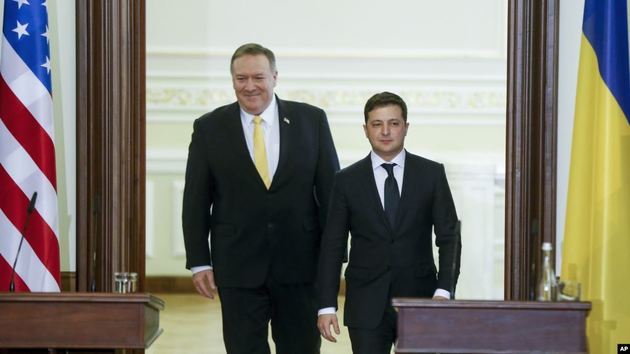US Secretary of State Michael Pompeo arrived in Ukraine on a working visit. Deputy Foreign Minister of Ukraine Yehor Bozhok vigorously wrote in Twitter that Pompeo is “a great US friend,” who has done much to support Ukraine “in difficult times of Russian aggression.”
The ‘dear guest’ has a busy program in Kiev - meetings with President Vladimir Zelensky, Foreign Minister Vadim Prystayko, Minister of Defense Andrey Zagorodniuk, as well laying wreaths in memory of those killed in the Donbass conflict. After that, the US Secretary will visit Belarus, Kazakhstan, and Uzbekistan. Pompeo’s trip to the post-Soviet countries was scheduled for early January, but the plans were corrected due to the events in Iraq.
Ukraine was waiting for the Secretary of State with undisguised impatience. With his arrival, Kiev hoped to clarify a number of questions. Firstly, whether it is worth hoping that the Minsk agreements on the Donbas settlement can be amended. The Ukrainian authorities seem a bit confused - what to do and when. Zelensky seems ready to announce, as stated in the agreements, the local elections in the Donbas. But the opposition categorically rejects such a step, first of all, Zelensky’s predecessor Petro Poroshenko and his people. The piquancy of the situation is that the Minsk agreements were signed by the previous team. Now Poroshenko believes that elections in the Donbas can be held only after the withdrawal of armed forces and the establishment of control over a section of the Ukrainian-Russian border in a turbulent region.
What Washington thinks is not very clear. On the one hand, the US requires Kiev to follow the Minsk agreements. But on the other hand, the whole world is already used to the fact that today's rhetoric of American politicians is generally something vague, and sometimes ‘yes’ may turn out to mean absolutely opposite, as, in fact, ‘no’.
Pompeo himself, in anticipation of the visit, announced that he intended to express support for Ukraine, which at the Budapest Summit received guarantees of peace and security from the United States in exchange for giving up its share of the nuclear weapons inherited from the USSR. On the eve of the visit of Michael Pompeo, the State Department issued a statement with quite unexpected content. It does not inform about current acute problems, which is usual on the eve of such visits reflecting the state of affairs in the region.
The State Department’s statement reads that the United States supported the transit of Russian gas through Ukraine, considering it a ‘strategic deterrent’ to Russian aggression in the future. Also, there is a reminder of the sanctions that the US imposed in December against companies involved in the construction of the Russian Nord Stream-2 gas pipeline, stressing that Washington supports Ukraine’s energy independence from Russian domination.
But it seems that something wrong with a statement, unless, of course, no translation or other errors have corrupted it.
How can one simultaneously welcome the resumption of the Russian gas transit through Ukraine, the resolution of the gas supply issue to Ukraine, and advocate for the independence of Ukraine from Russian energy domination?
Why has such ‘special attention’ suddenly been shown to the agreement on resumption of the Russian gas transit through Ukraine that was signed in December?
It is clear that in fact, the United States neither wants the Russian gas transit through Ukraine nor Nord Stream-2 implementation. America would like to manage all these issues by itself thus making Europe begging for gas. One might complete these not ungrounded fantasies with a quote from the Killing Them Softly movie: "America is not a country, it’s just a business”. But this is a real ‘apocalypse’ with one surviving player- Washington. Even the United States is obviously not yet capable of such an overtly cynical public misanthropy. Yes, this topic is somewhat different.
The logical explanation for the statement by the State Department is probably following: Washington may welcome the resumption of Russian gas transit through Ukraine on the eve of Pompeo’s visit to Kiev in one, perhaps, case, taking into account the realities and general agenda of negotiations with Zelensky. This apparently means an expression of US hope or confidence that Ukraine’s energy-Russian cooperation reduces the risks of an escalation of tension between Moscow and Kiev. According to Washington, firstly, Moscow will not attack the territory through which its gas passes, and secondly, Kiev, along with transit, received some leverage over Moscow, which could play in the interests of Ukraine in the confrontation with Russia in the Donbas.
Another logic is in the absence of logic. Visits by senior officials are always accompanied by explanatory statements, representations, etc. But in this case, almost nothing was said publicly. Everything is outspoken, all instructions are given to Kiev, the Minsk agreements have not budged - Ukraine is trying to pursue its own line. The vague part also includes Kiev’s role in the ongoing process of impeachment of US President Donald Trump. Moreover, in the past few days, Ukrainian President Vladimir Zelensky ‘distinguished himself’ in several ways - from unsuccessful and to some extent humiliating attempts to meet with President Vladimir Putin in Israel on his own to glaring statements and assessments of events related to World War II. Thus, Washington had no choice but to accompany Michael Pompeo’s visit to Kiev with a strange statement on the gas issue. Perhaps, a statement on the outcome of the visit will be more comprehensible and rich.






